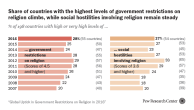This analysis combines survey results from two previously published Pew Research Center reports on European attitudes: “Religious Belief and National Belonging in Central and Eastern Europe” and “Being Christian in Western Europe.”
Surveys in Central and Eastern European countries were conducted face to face from June 2015 to July 2016 in 16 languages, with a nationally representative sample of about 1,400 or more adults in each country. More details on the methodology used in these countries, including margins of error and sample sizes, can be found here.
The surveys in Western Europe were conducted using landline and mobile telephone from April to August 2017 in 12 languages with a nationally representative sample size of about 1,500 or more adults in each country. More details on the methodology used in these countries, including margins of error and sample sizes, can be found here.
In addition, this report includes previously unpublished data from Slovakia. Interviews in Slovakia were conducted among 1,497 adults (ages 18 and older) via telephone in two languages (Hungarian or Slovakian) from April through August 2017. Interviewing was carried out under the direction of GfK Belgium using a combination of landline and mobile random-digit dialing.
The mode difference between the two survey waves (face to face vs. telephone) does not compromise cross-regional comparability since both sets of surveys were administered by interviewers and are similarly affected by interviewer effects, including the proclivity of respondents to give socially acceptable responses when talking to another person, sometimes referred to as “social desirability.”8 Research indicates that responses are more likely to differ between surveys that are interviewer-administered (either via telephone or face to face) and those that are self-administered (that is, when a respondent records answers to survey questions themselves, without the presence of an interviewer). None of the surveys analyzed in this report (either in Western Europe or in Central and Eastern Europe) were self-administered.
More details about the methodology used in both survey waves, including country-specific sample designs, are available here.
General information on international survey research at Pew Research Center is available here.




